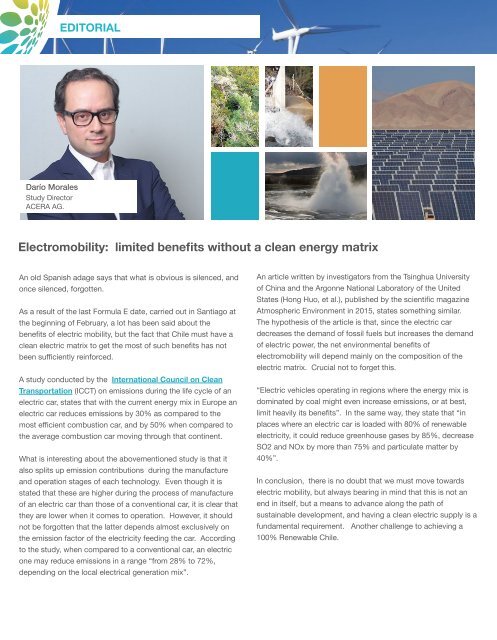Newsletter ACERA - Febrero 2018
Create successful ePaper yourself
Turn your PDF publications into a flip-book with our unique Google optimized e-Paper software.
EDITORIAL<br />
Darío Morales<br />
Study Director<br />
<strong>ACERA</strong> AG.<br />
Electromobility: limited benefits without a clean energy matrix<br />
An old Spanish adage says that what is obvious is silenced, and<br />
once silenced, forgotten.<br />
As a result of the last Formula E date, carried out in Santiago at<br />
the beginning of February, a lot has been said about the<br />
benefits of electric mobility, but the fact that Chile must have a<br />
clean electric matrix to get the most of such benefits has not<br />
been sufficiently reinforced.<br />
A study conducted by the International Council on Clean<br />
Transportation (ICCT) on emissions during the life cycle of an<br />
electric car, states that with the current energy mix in Europe an<br />
electric car reduces emissions by 30% as compared to the<br />
most efficient combustion car, and by 50% when compared to<br />
the average combustion car moving through that continent.<br />
What is interesting about the abovementioned study is that it<br />
also splits up emission contributions during the manufacture<br />
and operation stages of each technology. Even though it is<br />
stated that these are higher during the process of manufacture<br />
of an electric car than those of a conventional car, it is clear that<br />
they are lower when it comes to operation. However, it should<br />
not be forgotten that the latter depends almost exclusively on<br />
the emission factor of the electricity feeding the car. According<br />
to the study, when compared to a conventional car, an electric<br />
one may reduce emissions in a range “from 28% to 72%,<br />
depending on the local electrical generation mix”.<br />
An article written by investigators from the Tsinghua University<br />
of China and the Argonne National Laboratory of the United<br />
States (Hong Huo, et al.), published by the scientific magazine<br />
Atmospheric Environment in 2015, states something similar.<br />
The hypothesis of the article is that, since the electric car<br />
decreases the demand of fossil fuels but increases the demand<br />
of electric power, the net environmental benefits of<br />
electromobility will depend mainly on the composition of the<br />
electric matrix. Crucial not to forget this.<br />
“Electric vehicles operating in regions where the energy mix is<br />
dominated by coal might even increase emissions, or at best,<br />
limit heavily its benefits”. In the same way, they state that “in<br />
places where an electric car is loaded with 80% of renewable<br />
electricity, it could reduce greenhouse gases by 85%, decrease<br />
SO2 and NOx by more than 75% and particulate matter by<br />
40%”.<br />
In conclusion, there is no doubt that we must move towards<br />
electric mobility, but always bearing in mind that this is not an<br />
end in itself, but a means to advance along the path of<br />
sustainable development, and having a clean electric supply is a<br />
fundamental requirement. Another challenge to achieving a<br />
100% Renewable Chile.















